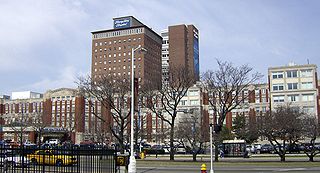Related Research Articles
In the United States, a health maintenance organization (HMO) is a medical insurance group that provides health services for a fixed annual fee. It is an organization that provides or arranges managed care for health insurance, self-funded health care benefit plans, individuals, and other entities, acting as a liaison with health care providers on a prepaid basis. The Health Maintenance Organization Act of 1973 required employers with 25 or more employees to offer federally certified HMO options if the employer offers traditional healthcare options. Unlike traditional indemnity insurance, an HMO covers care rendered by those doctors and other professionals who have agreed by contract to treat patients in accordance with the HMO's guidelines and restrictions in exchange for a steady stream of customers. HMOs cover emergency care regardless of the health care provider's contracted status.
The term managed care or managed healthcare is used in the United States to describe a group of activities intended to reduce the cost of providing health care and providing American health insurance while improving the quality of that care. It has become the predominant system of delivering and receiving American health care since its implementation in the early 1980s, and has been largely unaffected by the Affordable Care Act of 2010.
...intended to reduce unnecessary health care costs through a variety of mechanisms, including: economic incentives for physicians and patients to select less costly forms of care; programs for reviewing the medical necessity of specific services; increased beneficiary cost sharing; controls on inpatient admissions and lengths of stay; the establishment of cost-sharing incentives for outpatient surgery; selective contracting with health care providers; and the intensive management of high-cost health care cases. The programs may be provided in a variety of settings, such as Health Maintenance Organizations and Preferred Provider Organizations.
In U.S. health insurance, a preferred provider organization (PPO), sometimes referred to as a participating provider organization or preferred provider option, is a managed care organization of medical doctors, hospitals, and other health care providers who have agreed with an insurer or a third-party administrator to provide health care at reduced rates to the insurer's or administrator's clients.

Howard County General Hospital is a 225-bed, not-for-profit health care provider located in Columbia, Maryland.
The Vanderbilt University Medical Center (VUMC) is a medical provider with multiple hospitals in Nashville, Tennessee, as well as clinics and facilities throughout Middle Tennessee. VUMC is an independent non-profit organization, but maintains academic affiliations with Vanderbilt University. As of 2022, the health system had more than 3 million patient visits a year, a workforce of 40,000, and 1,709 licensed hospital beds.

The University of Pittsburgh Medical Center (UPMC) is an American integrated global nonprofit health enterprise that has 92,000 employees, 40 hospitals with more than 8,000 licensed beds, 800 clinical locations including outpatient sites and doctors' offices, a 3.8 million-member health insurance division, as well as commercial and international ventures. It is closely affiliated with its academic partner, the University of Pittsburgh. It is considered a leading American health care provider, as its flagship facilities have ranked in U.S. News & World Report "Honor Roll" of the approximately 15 to 20 best hospitals in America for over 15 years. As of 2016, its flagship hospital UPMC Presbyterian was ranked 12th nationally among the best hospitals by U.S. News & World Report and ranked in 15 of 16 specialty areas when including UPMC Magee-Womens Hospital. This does not include UPMC Children's Hospital of Pittsburgh which ranked in the top 10 of pediatric centers in a separate US News ranking.

Henry Ford Hospital (HFH) is an 877-bed tertiary care hospital, education and research complex at the western edge of the New Center area in Detroit, Michigan. The flagship facility for the Henry Ford Health System, it was one of the first hospitals in the United States to use a standard fee schedule and favor private or semi-private rooms over large wards. It was the first hospital in the country to form a closed, salaried medical staff. As founder Henry Ford viewed tobacco as being unhealthy, the hospital was one of the first in the United States to institute a total ban on smoking. Henry Ford Hospital is staffed by the Henry Ford Medical Group, one of the nation's largest and oldest group practices with 1,200 physicians in more than 40 specialties.

The Detroit Medical Center (DMC) is a for-profit alliance of hospitals that encompasses over 2,000 licensed beds, 3,000 affiliated physicians and over 12,000 employees. Located in Midtown Detroit, the DMC is affiliated with medical schools from Wayne State University and Michigan State University. Detroit Medical Center hospitals are staffed by physicians from the Michigan State University College of Osteopathic Medicine and the Wayne State University School of Medicine, the largest single-campus medical school in the United States and the nation's fourth largest medical school overall. The Detroit Medical Center is fully accredited by the Joint Commission on Accreditation of Healthcare Organizations.
Case management is a managed care technique within the health care coverage system of the United States. It involves an integrated system that manages the delivery of comprehensive healthcare services for enrolled patients. Case managers are employed in almost every aspect of health care and these employ different approaches in the control of clinical actions.
John Muir Health is a hospital network headquartered in Walnut Creek, California and serving Contra Costa County, California and surrounding communities. It was formed in 1997 from the merger of John Muir Medical Center and Mount Diablo Medical Center.

Advocate Lutheran General Hospital (ALGH) is a 645-bed non-profit teaching hospital located in the Chicago suburb of Park Ridge, Illinois. Founded in 1897, Advocate Lutheran General Hospital is the sixth largest hospital in the Chicago area, and it operates a Level I trauma center. It also is home to Advocate Children's Hospital – Park Ridge, the only children's hospital in the greater north and northwest suburban region of Chicago. The hospital is a part of Advocate Aurora Health.
Providence Mission Hospital is a 523-bed acute care regional medical center in Orange County, California with two campuses - one in Mission Viejo, and the second in Laguna Beach. The hospital has designated adult and pediatric Level II Trauma centers in the state of California. Mission Hospital provides cardiovascular, neuroscience and spine, orthopedics, cancer care, women's services, mental health, wellness and a variety of other specialty services. Mission Hospital in Laguna Beach (MHLB) provides South Orange County coastal communities with 24-hour emergency and intensive care as well as medical-surgical/telemetry services, orthopedics and also general and GI surgery. CHOC Children's at Mission Hospital is a 48-bed facility that is the area's only dedicated pediatric hospital. Mission Hospital is one of only 3 Hospitals in Orange County rated as a Regional Trauma Center.
MedStar Health is a not-for-profit healthcare organization. It operates more than 120 entities, including ten hospitals in the Baltimore–Washington metropolitan area of the United States. In 2011 it was ranked as the employer with the largest number of local employees in the region.

Ascension Saint Thomas Hospital Midtown, formerly known as Baptist Hospital, is a non-profit community hospital in Nashville, Tennessee, United States and the largest such hospital in Middle Tennessee. It is licensed for 683 acute and rehab care beds.
McLaren Health Care Corporation, headquartered in Grand Blanc, Michigan, is a $6.6 billion, fully integrated health care delivery system committed to quality, evidence-based patient care and cost efficiency. The McLaren system includes 14 hospitals in Michigan, ambulatory surgery centers, imaging centers, a 490-member employed primary and specialty care physician network, commercial and Medicaid HMOs covering more than 732,838 lives in Michigan and Indiana, home health, infusion and hospice providers, pharmacy services, a clinical laboratory network and a wholly owned medical malpractice insurance company. McLaren operates Michigan’s largest network of cancer centers and providers, anchored by the Karmanos Cancer Institute, one of only 53 National Cancer Institute-designated comprehensive cancer centers in the U.S. McLaren has 28,000 full-time, part-time and contracted employees and more than 113,000 network providers throughout Michigan and Indiana. They used to operate in Ohio, but ended up shutting down St. Luke’s Hospital, and selling both the hospital, along with WellCare Physicians Group, to Bon Secours Mercy Health.

United Health Services (UHS) (United Health Services Hospitals, Inc.) is the largest and most comprehensive provider of healthcare services in upstate New York's Southern Tier.
Paul Murdock Ellwood Jr. was an American physician and a controversial figure in American health care. Often referred to as the "father of the health maintenance organization", he not only coined the term, he also played a role in bringing about structural changes to the American health care system to simultaneously control cost and promote health by replacing fee-for-service with prepaid, comprehensive care. The term "HMO" was coined by Ellwood in a January 1970 Fortune magazine article. More recently, he had advanced an agenda for monitoring health outcomes, so that patients, providers, and payers can make health care decisions based on real information about what treatments and providers are actually effective.

The medical–industrial complex is a network of interactions between pharmaceutical corporations, health care personnel, and medical conglomerates to supply health care-related products and services for a profit. The term is a product of the military–industrial complex and builds from the basis of that concept.
A safety net hospital is a type of medical center in the United States that by legal obligation or mission provides healthcare for individuals regardless of their insurance status or ability to pay. This legal mandate forces safety net hospitals (SNHs) to serve all populations. Such hospitals typically serve a proportionately higher number of uninsured, Medicaid, Medicare, Children's Health Insurance Program (CHiP), low-income, and other vulnerable individuals than their "non-safety net hospital" counterpart. Safety net hospitals are not defined by their ownership terms; they can be either publicly or privately owned. The missions of safety net hospitals are rather, to focus and emphasize their devotion to providing the best possible care for those who are barred from health care due to the various possible adverse circumstances. These circumstances mostly revolve around problems with financial payments, insurance plans, or health conditions. Safety net hospitals are known for maintaining an open-door policy for their services.
Advocate Illinois Masonic Medical Center is a 408-bed non-profit teaching hospital located in Chicago. Founded in 1897, the hospital operates a Level I trauma center and Level III Perinatal Center. Its license number is 0005165. The hospital is a part of Advocate Aurora Health. Each year, the hospital provides services for 18,000 inpatients, more than 152,000 outpatients and 41,000 emergency patients. Approximately 300 physicians are trained each year through its affiliations with the University of Illinois College of Medicine, the Chicago Medical School and the Chicago College of Osteopathic Medicine.”
References
- ↑ Jenny Gold (June 9, 2015). Highest-Charging U.S. Hospitals Are For-Profit And Concentrated In Florida. NPR. Retrieved June 20, 2015.
- ↑ https://olis.leg.state.or.us/liz/2019R1/Downloads/CommitteeMeetingDocument/190449 [ dead link ]
- ↑ Wohl, Stanley. The Medical Industrial Complex / Stanley Wohl. First edition. New York: Harmony Book, 1984: 85-98
- ↑ Chandran, Prabha (July 15, 2016). "Exclusive: Doctors And Hospitals Are Playing With Lives For Profit, Say Authors Of Medical Exposé".
- Adapted from the Wikinfo article: http://www.internet-encyclopedia.org/wiki.php?title=For-profit_hospital